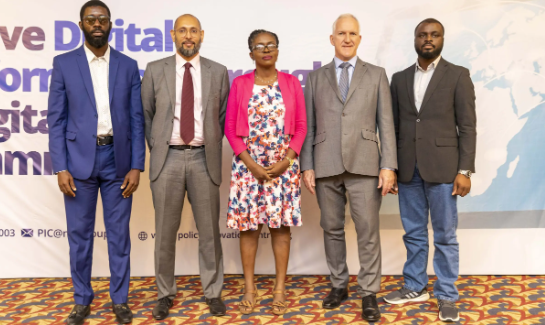UK Foreign and Commonwealth Development Office (FCDO) and experts in the Nigerian tech space have called for the implementation of policies to improve digital literacy and reduce the digital skill gap in the country.
The experts spoke at the ‘Inclusive Digital Transformation Programme’ in Lagos to advance inclusive digital development through an enhanced policy and regulatory framework for the Nigerian economy.
The event was attended by members of the public sector MDAs, ICT professional bodies, digital inclusion start-ups, and corporate players in the digital space.
Reason For The Call
Guy Harrison, the economic counsellor to the deputy high commissioner in Lagos, said the aim of the event is to create a sense of support and partnership between the public and private to create a framework that can provide the right regulations and provide safeguards that encourage the private sectors to contribute more to the Nigerian economy.
Harrison noted that Nigeria has the potential to experience rapid growth in its Gross Domestic Product (GDP) through human capital development in the area of information technology and bridging the digital literacy gap.
He said a review of existing digital frameworks can accelerate partnership opportunities between companies in Nigeria and the UK.

“We have already taken a group of Nigerian companies to the UK by April for a matchmaking mission,” Harrison said. “We very much hope this will create a virtual circle of good governance, good regulations and framework that is great for Nigerians and businesses.”
Faisal Naru, Executive Director at Policy Innovation Centre (PIC) said the policies being implemented by the government have to be right for there to be a good and enabling environment for people and businesses to thrive.
“It’s important to have this kind of dialogue to make sure that the right policies are in place and that things are working right for businesses,” Naru said.
Read Also : Nigerian StartUp, Aceplora To Equip Young People with Tech skills
“I expect in this conversation for us, first of all, to get different actors to start talking together, who maybe have not been speaking before at the federal level, state level, private sectors, donor’s funders, investor, banks. It’s important for them to speak together to understand what each other is going through and then co-create solutions that will actually work for people in Nigeria and for the better of the Nigerian economy.”
Idongesit Udoh, Head, UK Digital Access Programme, noted that millions of people in rural communities are left behind in the broadband connectivity, adding that efforts have to be intensified to reach such people.
Udoh said the UK access programme is working to help about 60% of Nigerians without digital skills to acquire one to function in the digital economy.
He said the UK is partnering with key stakeholders to build digital skills capacity for women and girls, people living with disabilities, and those without basic digital skills.
FG targets 95% Digital Literacy in Nigeria by 2030
Meanwhile, the National Information Technology Development Agency, NITDA, has said the Federal Government hopes to achieve 95 digital literacy in the country by 2030.
Director-General of NITDA, Kashifu Abdullahi said this, at an Innovation, Research, and Software summit organised by the National Association of Computing Students in Abuja.
Speaking on the topic titled, ‘Technology Renaissance for Innovation and Productivity, Abdullahi revealed that the government had trained 200,000 youths in the use of productivity tools, digital content creation and digital marketing this year alone.
He said, “Globally, the most valuable companies in the world are in Information Technology.
“Today, even the richest countries are getting more money from the digital economy than resources like crude oil.
“At NITDA, we crafted our strategic roadmap and action plan 2021 to 2024 with seven strategic pillars to help youths benefit from the national digital economy policy.
Read Also : Bloc Acquires Orchestrate to Improve Payment Services
“We have a target of achieving 95 per cent digital literacy by 2030. So, we have launched many initiatives to train people. “This year alone, we have trained close to 200,000 Nigerians in different areas of digital literacy.” According to him, the Federal Government launched the digital Nigeria online portal where youths can go online to acquire training in digital literacy.
“We also have the NITDA academy, which is equally a self-learning platform.
“The government is developing a framework to license private organisations to also carry-out digital literacy training because we know that government cannot do it alone,” he added.
Abdullahi described the COVID-19 pandemic as a blessing in disguise, saying the experience created an opportunity for technology and innovation to drive economic activities in the country.
“We understand that Information Technology is dynamic. So, what we are trying to do is to help youths use innovation to create prosperity for our country.
“Just recently, we identified five start-ups, and we are working with the Nigeria Export Promotion Council to give them between N15m to N20m each as a grant to develop their products,” the Director-General stated.
Speaking also, the Executive Director of Financial Services Innovators, Mrs Aituaz Kola-Oladejo, however, lamented that innovation was yet to be democratised in Nigeria.
“Democratising innovation will create products at affordable rates for Nigerians. This is when we, as a nation, will fully achieve digital, social, financial, and economic inclusion,” she said.
In his remarks, the President, of the National Association of Computing Students, Comrade Olamilekan Abolade, said the body was focused on empowering a new crop of innovative young men and women who will add technology value to every sector of the economy and solve real-life problems.
According to him, “We want to use our power as students to push for the rebirth of technology, which is the enabler for adequate innovations and ensuring productivity”.
